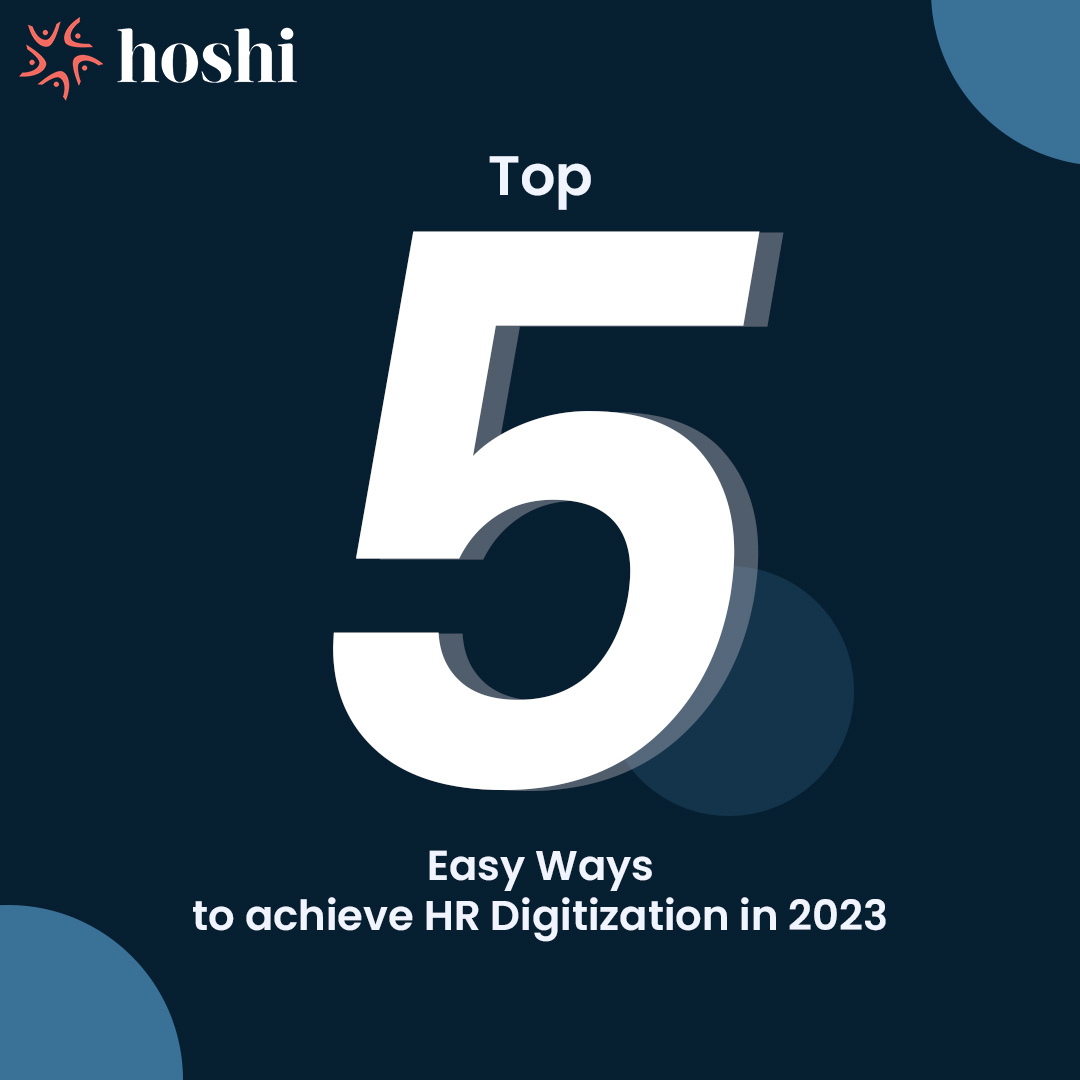Top 5 Easy Ways to Achieve HR Digitization in 2023
Top 5 Easy Ways to Achieve HR Digitization in 2023
HR Digitization Meaning: HR digitization refers to the process of converting HR operations, processes, and functions into digital formats that can be easily accessed, processed, and managed through the use of technology. This includes tasks such as recruitment, onboarding, performance management, payroll, benefits administration, and employee data management, among others. By digitizing HR, organizations can streamline their operations, increase efficiency, and enhance employee experience.
The good news is that there are several easy ways to achieve HR digitization that don't require a massive overhaul of your current processes. In this post, we'll cover the top five easy ways to achieve HR digitization in 2023.
-
Implement a Cloud-Based HRMS
One of the easiest ways to achieve HR digitization is to implement a cloud-based HRMS (Human Resource Management System). Cloud-based HRMS software allows you to centralize all HR data in one place and makes it easily accessible to all employees and managers. It eliminates the need for paper-based records and manual processes, making HR tasks faster and more efficient. Additionally, cloud-based HRMS software is highly secure and can be accessed from anywhere with an internet connection.
-
Use an Automated Recruiting System
Recruiting is a crucial aspect of HR, and it's also one of the most time-consuming. Implementing an automated recruiting system can help save time and improve the quality of your hires. Automated recruiting systems use AI-powered algorithms to screen resumes, identify qualified candidates, and even conduct initial interviews. This saves HR professionals a significant amount of time and allows them to focus on more strategic tasks, such as building relationships with candidates and developing employer branding.
-
Digitize Employee Files
One of the most significant advantages of HR digitization is the ability to eliminate paper-based records. Digitizing employee files is a straightforward way to achieve this. It allows you to store all employee data in a central location, making it easy to access and update. Additionally, it helps eliminate the risk of lost or damaged documents. Using an electronic document management system can help streamline the process of digitizing employee files.
-
Implement a Self-Service HRMS Portal
Self-service portals empower employees to take control of their own HR needs, such as updating personal information, accessing pay stubs, and requesting time off. This not only saves time for HR professionals, but it also gives employees more autonomy and ownership over their HR needs. Additionally, implementing a self-service portal can help reduce the number of inquiries and requests HR professionals receive, freeing up time for more strategic tasks.
-
Use Chatbots for HR Assistance
Chatbots are a relatively new technology that uses AI to automate conversations with users. Implementing a chatbot for HR assistance can help streamline the process of answering common HR questions, such as how to update personal information or how to request time off. This not only saves time for HR professionals, but it also provides employees with an immediate response to their questions, improving their overall experience.
In conclusion, achieving HR digitization doesn't have to be a daunting task. By implementing a cloud-based HRMS, using an automated recruiting system, digitizing employee files, implementing a self-service portal, and using chatbots for HR assistance, HR professionals can take significant steps towards digitizing their operations. These easy and effective strategies can help improve efficiency, reduce costs, and provide a better experience for both employees and managers.

Top 7 Benefits of Digital Transformation in HR Department.
-
Increased efficiency and productivity in HR processes through automation.
-
Improved employee engagement and satisfaction with self-service tools.
-
Better talent acquisition and retention through data-driven recruitment and retention strategies.
-
Enhanced compliance with regulatory requirements through digital records management.
-
More effective performance management and training programs through data analytics.
-
Faster and more accurate payroll processing and benefits administration through digital platforms.
-
Increased agility and adaptability in response to changing business needs and market conditions.
By leveraging data analytics, automation, and other technologies, HR departments can improve their recruitment and hiring processes, enhance employee engagement and performance, and better manage their workforce.

What Challenges a HR Department will face in Digital Transformation?
-
Resistance to change from employees and management.
-
Lack of digital skills and expertise among HR professionals.
-
Difficulty integrating new digital tools with legacy systems.
-
Ensuring data privacy and security in the digital age.
-
Managing the increased volume and complexity of data.
-
Balancing the use of automation with the need for human interaction in HR processes.
-
Navigating the legal and regulatory implications of digital transformation in HR.
Here are some Real-world Examples of Companies that have Successfully implemented Digital Transformation in their HR Departments:
IBM: IBM has implemented an HR digital transformation initiative that includes the use of AI-powered chatbots to answer employee questions and automate routine HR tasks. This has reduced the time and resources required for HR tasks, freeing up HR staff to focus on more strategic initiatives.
Unilever: Unilever has implemented a digital transformation initiative in their HR department that includes the use of data analytics to identify talent gaps and improve workforce planning. This has allowed Unilever to make more informed decisions about hiring, training, and talent management.
Nestle: Nestle has implemented a digital transformation initiative in their HR department that includes the use of digital platforms for recruitment and employee engagement. This has improved the candidate experience and made it easier for HR staff to manage employee feedback and communication.
Deloitte: Deloitte has implemented a digital transformation initiative in their HR department that includes the use of predictive analytics to identify top-performing employees and develop more effective talent management strategies.
Cisco: Cisco has implemented a digital transformation initiative in their HR department that includes the use of automation and machine learning to streamline HR processes and improve the employee experience. This has reduced errors and improved the accuracy of HR data, making it easier for Cisco to make informed decisions about workforce planning and talent management.
These are just a few examples of companies that have successfully implemented digital transformation initiatives in their HR departments. As technology continues to evolve, we can expect to see even more innovative and effective uses of digital tools and platforms in HR.

How to become Champions of Digital Transformation among HR Professionals:
|
|
|
|
|
|
|
|
|
|
|
|
|
|
|
|
|
|
|
|
|
By developing these skills and expertise, HR professionals can become champions of change in their organizations and drive successful digital transformation initiatives in their HR departments.

10 Best Tips for Successful Digital Transformation in HR Process:
-
Start with a clear vision and strategy: Define your goals and objectives for digital transformation in HR, and create a roadmap to achieve them.
-
Get buy-in from senior leadership: Secure executive sponsorship and support to ensure the success of your digital transformation initiatives.
-
Involve employees in the process: Involve employees in the planning and implementation of digital transformation initiatives to ensure their adoption and success.
-
Prioritize the right technologies: Identify the HR technologies that are most critical to achieving your goals and invest in those first.
-
Choose the right partners: Select technology vendors and implementation partners who have experience and expertise in your industry and business needs.
-
Focus on data security and privacy: Ensure that your digital transformation initiatives comply with data security and privacy regulations to protect employee and company data.
-
Develop new skills and expertise: Train HR professionals on the new technologies and processes required for digital transformation, and hire new talent as needed.
-
Implement change management strategies: Use change management strategies to help employees adapt to new processes and technologies.
-
Monitor and measure success: Track and measure the impact of your digital transformation initiatives on HR processes, employee engagement, and business outcomes.
-
Continuously improve: Continuously evaluate and improve your digital transformation initiatives to ensure they align with the changing needs of your organization and employees.

Best Funnel on Future Trends in Digitization of HR Process:
-
Increased focus on employee experience: With digital transformation, HR departments will need to shift their focus from administrative tasks to improving employee experience. This includes personalized training and development, better communication channels, and improved work-life balance.
-
Greater use of AI and machine learning: AI and machine learning will become more prevalent in HR processes, including recruitment, performance evaluation, and employee engagement. This will allow for more data-driven decision-making and automation of routine tasks.
-
Expansion of remote work: The COVID-19 pandemic has accelerated the trend towards remote work, and this is likely to continue in the future. HR departments will need to adapt to this by implementing new policies and technologies that support remote work, such as virtual collaboration tools and remote onboarding.
-
Increased use of analytics and big data: As HR departments become more data-driven, the use of analytics and big data will become increasingly important. HR professionals will need to be able to collect and analyze large amounts of data to make better decisions.
-
Integration of blockchain technology: Blockchain technology has the potential to revolutionize HR processes such as payroll and employee records management. It offers enhanced security, transparency, and efficiency, and is likely to become more widely adopted in the future.
-
Emphasis on diversity, equity, and inclusion: Digital transformation in HR will also provide an opportunity to address issues of diversity, equity, and inclusion. HR departments will need to use technology to create more inclusive hiring practices and promote diversity and equity in the workplace.
-
Focus on upskilling and reskilling: As the nature of work changes with the adoption of new technologies, HR departments will need to focus on upskilling and reskilling employees to ensure they have the skills needed for the future.
-
Shift towards agile HR: HR departments will need to adopt agile methodologies to keep pace with the rapidly changing business environment. This means being more responsive to changing business needs and adopting a more flexible approach to HR processes.
-
Increased use of chatbots and virtual assistants: Chatbots and virtual assistants can be used to streamline HR processes such as recruitment, onboarding, and benefits administration. They offer a more efficient and convenient way for employees to interact with HR departments.
-
Greater use of cloud-based HR solutions: Cloud-based HR solutions offer greater flexibility and scalability than traditional on-premise solutions. As such, they are likely to become more widely adopted in the future as HR departments seek to become more agile and adaptable to changing business needs.

Test the Best HRMS Software: (Go for Free trial before finalizing the product)

